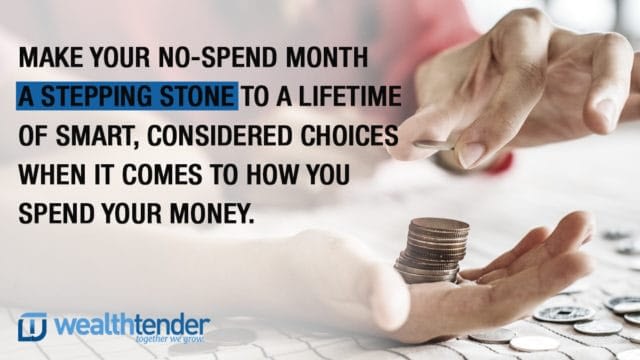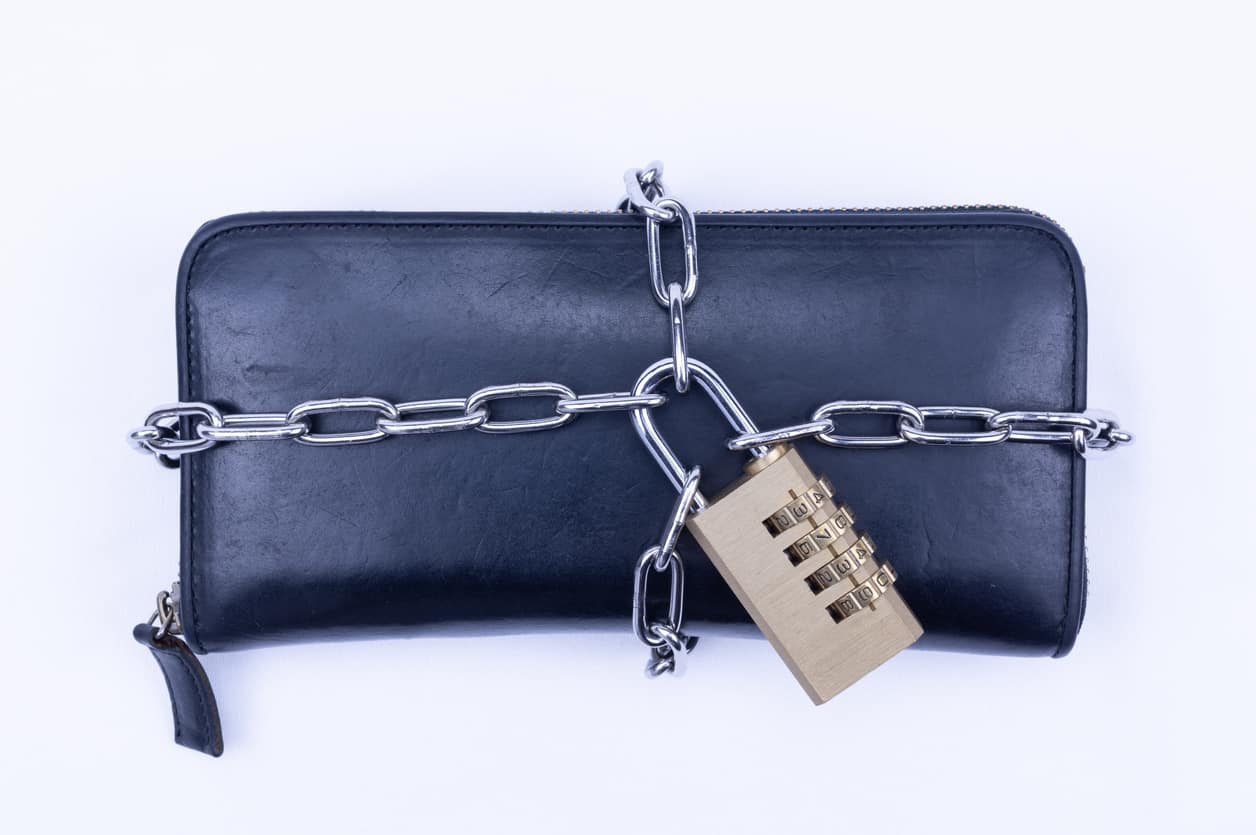Wealthtender is a trusted, independent financial directory and educational resource governed by our strict Editorial Policy, Integrity Standards, and Terms of Use. While we receive compensation from featured professionals (a natural conflict of interest), we always operate with integrity and transparency to earn your trust. Wealthtender is not a client of these providers. ➡️ Find a Local Advisor | 🎯 Find a Specialist Advisor

Want to change your money mindset? Try a no-spend month. The benefits are more varied and far-reaching than you might imagine.
A no-spend month is exactly what it sounds like. You pick a month and decide you simply won’t spend any money until the month is over. How drastic you are with the concept is up to you.
You’re not expected to starve or default on your utility bills. You are expected to avoid all unnecessary spending and be fairly strict with yourself over what you define as necessary.
Does it have to be a month? Not necessarily. You can do a 7-day no-spend challenge or a 100-day no-spend challenge. Some people take it further, complete a no-spend year, and write a book about it.
Obviously, you will have to buy food and other depletable items such as personal care products and cleaning products, but it can be helpful to set boundaries around this too. Many people decide that they will only buy food when they’ve eaten everything already in their fridge and pantry or that they’ll only buy personal care or beauty products if they run out of something specific (and don’t have anything else on their shelf that can function as a perfectly good alternative).
In the spirit of the no-spend challenge, you should probably agree not to eat out or spend on entertainment, although you can, of course, make exceptions for previously planned social events so as to not let other people down. So that covers how to do a no-spend challenge. But why would you want to?
You’ll Save Money
Perhaps the most obvious benefit of a no-spend month is that you’ll save money. Potentially quite a lot of money. A no-spend month isn’t a replacement for tracking your spending and setting a proper budget, but it is one way to see just how much of your spending is ‘discretionary’, which roughly translated means unnecessary.
If you lack motivation or enthusiasm for this no-spend idea, make a plan for what to do with the money you save. You might want to pay off debt, build up investments, or save toward something important to you that there just isn’t room for in your current budget.
You’ll Eliminate Impulse Spending
As we’ve discussed before, impulse spending carries a lifetime price tag of over $300,000 for the average American. If you’re not spending, you’re not impulse spending, and you may even start to reset your brain as you realize you don’t really miss the buzz of those ‘fun’ impulse buys at all.
You Might Lower Your Stress
Spending impulsively sounds like a fun thing to do, but in reality, decisions are stressful. Many of us make dozens of decisions a day about whether to spend or not spend and use precious energy debating with ourselves, justifying purchases, or trying to employ willpower to resist the impulse to spend.
Removing the option to spend can be surprisingly freeing. You simply don’t have any extra decisions to make in that area of your life. The decision is already made. You’re not spending this month.
You’ll Become More Resourceful
Depending on how strict you are with yourself, you may find yourself trying new recipes, making things from scratch, or reusing, repurposing, and upcycling what you already have. All these things can deliver a hefty dose of self-accomplishment, not to mention being more environmentally sustainable than hitting the mall.
You’ll Use What You Have
A no-spend month is a great time to re-organize your home and take stock of what you have. In Western countries, many of us have store cupboards, medicine cabinets, and random drawers full of depletable products we don’t use and eventually throw out. Learning to be less wasteful is another mini mindset reset that can actually make us feel better about ourselves and our choices.
You’ll Rediscover that (Some of) the Best Things in Life are Free
A no-spend month can make you get creative with how you use your time. Many people report that it forces them to do things with their time that they’d forgotten they even enjoyed, like playing games with their kids, taking long walks in nature, and reconnecting with their significant other. Once your entertainment budget is on hold, you’ll discover (or rediscover) that some of the things you enjoy doing really are free, and some of them may even improve your health, happiness, and relationships.
“The idea of a “no-spend month” may seem overwhelming and restrictive, but, in my opinion, it is an effective way to reset spending habits and improve financial health,” said Becky Neubauer, Founder of TwentyFree.
“When I was working on paying off all my student loan debt, I had plenty of no-spend months! In the beginning, I learned that I have more control than I gave myself credit for, and, in the long run, each month got easier and easier because I was seeing the big benefits of sticking to my no-spend plan and budget, which really kept me motivated.”

And the Drawback?
A no-spend month is a great challenge, but it’s tempting to see it as just that. A challenge. A short-term experiment. You may go back to your normal spending patterns the day it finishes. You may even find you spend more money immediately after a no-spend month as you “make up” for the deprivation you’ve been feeling.
“I recommend my clients pick a no-spend week instead of a whole month, “ said Christine Luken, The Financial Dignity® Coach.
“People end up procrastinating because it’s hard to find an entire month when they can do it. There are always excuses like: ‘I can’t do it this month because of the holidays/ vacation/ company is coming, etc.’ So start with a no-spend week because you’re more likely to actually do it and be successful!”
A no-spend month can be an interesting way to focus attention on how much of your day-to-day spending is unnecessary, wasteful, and even stressful. But ultimately, most of us living in consumer-oriented societies need a more permanent solution.
Honestly, I probably wouldn’t benefit now from a no-spend month because I’ve finally reached a point in my life where I practice considered, mindful, and spending almost all the time. Yes, I said “almost.” None of us are perfect.
The Bottom Line
If you’re considering a no-spend challenge, try to look at it as a chance to implement a total reset on your money mindset, attitudes, and spending patterns. Don’t end the month and go straight back to your pre-challenge spending habits.
Leverage the fact that you now know you don’t need to buy as much stuff as you thought you did. Switch from ‘no spending’ to ‘mindful spending’. Stop, consider and assess before pulling your wallet out. Make your no-spend month a stepping stone to a lifetime of smart, considered choices when it comes to how you spend your money.

About the Author
Karen Banes
I’m a freelance writer specializing in online business, personal finance, travel and lifestyle. I also work as a content creator for hire, helping brands and businesses tell their stories, grow their audiences, and reach their ideal customers. I’ve lived, worked and studied in six countries, across three continents. Stop by my blog TheSavvySolopreneur.net to learn how to run your own (very) small business on your own terms. You can also connect with me at my website KarenBanes.com or follow me on Medium.com.
Wealthtender is a trusted, independent financial directory and educational resource governed by our strict Editorial Policy, Integrity Standards, and Terms of Use. While we receive compensation from featured professionals (a natural conflict of interest), we always operate with integrity and transparency to earn your trust. Wealthtender is not a client of these providers. ➡️ Find a Local Advisor | 🎯 Find a Specialist Advisor

